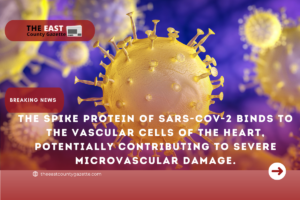A new study has shown that SARS-CoV-2 may contribute to the severe microvascular damage observed in COVID-19 patients who are severely ill by transforming human heart vascular cells into inflammatory cells without infecting them, according to the findings.
According to the findings of the University of Bristol-led study, which was published in Clinical Science, blocking antibodies may represent a new treatment option for the prevention and treatment of cardiovascular complications.

In this new study, a multidisciplinary research team from the University of Bristol’s Bristol Heart Institute sought to understand how SARS-CoV-2 interacts with heart cells, resulting in the myocardial damage seen in COVID-19 patients, and how this interaction might be prevented.
Jusqu’à this point, researchers were unsure whether heart cells were being infected by the virus or being damaged as a result of excessive cytotoxic defense response.
Known as the cytokine storm, this response is triggered by our immune cells, which attack and kill infected cells by releasing proteins known as cytokines. Cytotoxic cells are the cells that cause this attack and death. A second goal of the team was to determine whether heart cells are involved in the production of excessive cytokines.
A research team led by Professor Paolo Madeddu of the University of Bristol exposed human heart pericytes, which are cells that wrap small blood vessels in the heart, to SARS-CoV-2 Alpha and Delta variants, as well as the original Wuhan virus, in order to better understand how the virus spreads. They were surprised to discover that the heart pericytes were not infected.
In response to this discovery, the researchers conducted a second test-tube experiment in which they challenged the cardiac pericytes only with the spike protein and not with the virus.
Read More: A $100 Million Grant Allotted for a Homeless Housing Project.
Interestingly, the spike protein rendered pericytes incapable of communicating with their companion endothelial cells and caused them to secrete pro-inflammatory cytokines, suggesting that the spike protein is harmful to human cardiac cells.
Interestingly, the researchers discovered that antibodies that blocked CD147—a receptor for the spike protein—were able to prevent damage to heart pericytes.
The presence of the SARS-CoV-2 spike protein in blood samples obtained from COVID-19 patients was also discovered by the research team, raising the possibility that spike protein particles traveling through the circulation could reach a site other than the respiratory system and cause systemic damage.
Dr. Elisa Avolio, the study’s first author and a professor at the University of Bristol Medical School, stated that the findings were surprising: “Even though pericytes are essential cells of the heart, it has only recently been discovered that they play a role in maintaining the structural integrity of the coronary vascular tree.
We are currently conducting research on human cardiac pericytes, which has revealed that these cells collaborate with coronary endothelial cells during the healing process following a heart attack.
According to the findings of this new study, the spike protein compromises this interaction and causes pericytes to transform into inflammatory cells. Hopefully, CD147 blocking antibodies will prove to be a useful new treatment option for COVID-19 patients suffering from cardiovascular complications in the future.”
He was joined by Professor Paolo Madeddu, a cardiologist and the study’s principal investigator from the University’s Bristol Medical School “Microvascular complications are common and dangerous in patients with COVID-19, with up to 11 percent of those admitted to intensive care units suffering from myocardial damage or having suffered a heart attack as a result of their illness.
Aside from that, people who have pre-existing cardiovascular disease are more likely to die as a result of COVID-19 infection.”
“Our findings suggest that SARS-CoV-2 can cause damage to vascular cells without infecting them, which is a novel finding. Furthermore, the damage caused by the engagement of the full virion with vascular cells could be exacerbated by the presence of cleaved spike protein particles.”
It has been discovered that the Omicron variant has multiple mutations in its spike protein, which aids the virus’ ability to enter and infect human cells, resulting in increased transmissibility and stronger binding with human cells.”
“However, in the case of the current Omicron wave, experts say there haven’t been any reports of cardiac symptoms so far, although it is still too early to tell for certain.
If this is confirmed, it may indicate that there is a dissociation between the infectivity of SARS-CoV-2 and its ability to cause cardiac cell damage. The multifunctional spike protein is the key determinant in the occurrences described above.”
